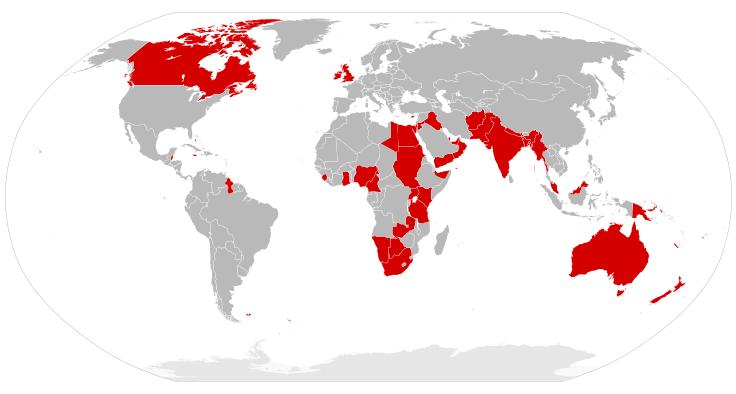 | ||
The British Empire in 1919 © Sbrools | ||
Likewise, the world-wide spread of the English language was not due to military conquest alone, as evidenced by the fact that the United States did not repudiate it after defeating the British. Moreover, the attraction was not so much linguistic as cultural: the desirability of certain principles and practices, as influenced by a strong Christian tradition, and promoted by the English-speaking nations via the British Empire and other agencies. The slide shows the extent of the British Empire in 1919, the subsequent decline of which, especially after World War 2, saw its roles increasingly taken up by the US – but even more so by international agencies – indeed, English has very much become the language of choice for the well-educated and internationally-minded, as its role as lingua franca of this conference attests. However, its use has gradually declined in many of the former British and US colonies, and its official role in international telecommunications is not properly enforced. For example, the London “Times” reported on 12 June 2008, after a “near miss” exacerbated by language difficulties, that only 15 out of 800 Polish pilots flying internationally had passed the test for the required standard of English. Moreover, it might now seem unlikely for various reasons that an English-speaking cultural rubric will prevail in the world, and with the well-publicised economic problems of the English-speaking nations and the apparent growth of the Chinese economy towards global dominance, some say that Putonghua – the official language of China – might eventually follow historic precedent and take over the role of chief international language. But Putonghua is very difficult for most Westerners, and political opposition would probably be no less than it has been against English. And in any case, the notion of Planet Earth as homeland of one people has come of age, and the concept of a truly international culture rather than an extended national culture has grown accordingly. Likewise, the realisation has dawned that the choice of an essentially national language gives the host nations an unfair advantage in negotiations, quite apart from the natural mother tongue mastery of linguistic irregularities and difficulties. So in the absence of a primary language expressing a truly global culture, the idea of a newly-constructed and culturally-neutral international auxiliary language has emerged, and is widely seen as another alternative to the multilingualist status quo.
| ||